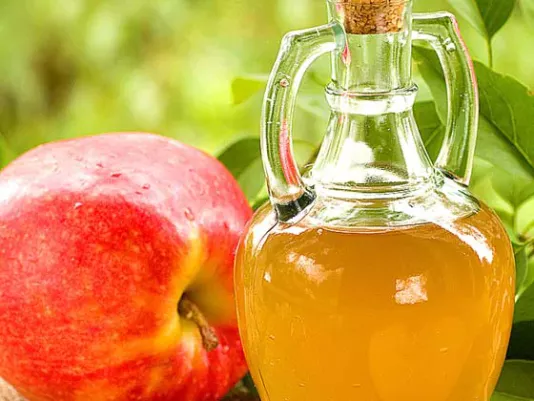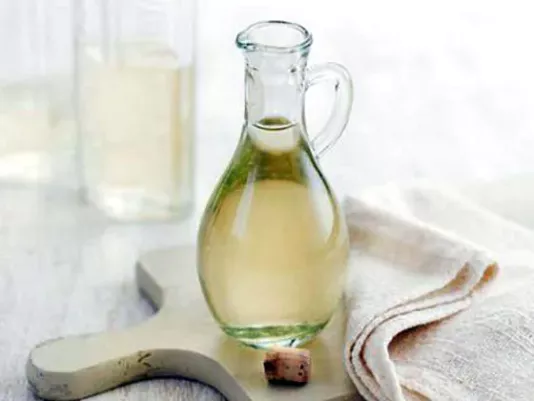Vinegars
Vinegars hold a special place in my cooking because they can change the character of a dish with just a few drops. I love using apple cider vinegar in salad dressings because it adds lightness and fruity notes. Wine vinegar is a real helper for me in sauces and marinades, where it enhances the flavor of meat or vegetables. I always keep balsamic vinegar for special occasions – it makes even a simple dish elegant by adding a sweet-and-sour note. Rice vinegar I discovered thanks to Asian cuisine, and now it often appears in dishes with rice or seafood. For me, vinegars are a universal tool that helps achieve flavor balance, making dishes more expressive and interesting. I am convinced that their place in the kitchen is just as important as spices or herbs.
Different Types of Vinegars
Apple Cider Vinegar in Everyday Cooking
Apple cider vinegar has always been a versatile kitchen helper for me because it combines light acidity with fruity aroma. I often add it to salad dressings, mixing it with oil, mustard, or honey, and the result is a balanced taste that highlights the freshness of vegetables. In marinades, apple cider vinegar helps tenderize meat and enrich it with pleasant fruity notes. I love using it in baking when I need to give the dough lightness or activate baking soda, and the result always turns out successful. I have also found that apple cider vinegar is excellent for pickling vegetables and fruits, as it not only adds flavor but also ensures reliable preservation. For me, it has become a true symbol of home cooking, helping to create both simple dishes and refined combinations. I always keep it in the kitchen, knowing that just a few drops of this vinegar can transform a dish and make it more interesting.
Wine Vinegar and Its Deep Flavor
I discovered wine vinegar as an ingredient that gives dishes special depth and sophistication. I love adding it to meat marinades because it helps make the meat tender and juicy while adding light acidity that perfectly balances the taste. In sauces, wine vinegar works just as well: a few drops can enhance the flavor of vegetables, fish, or poultry, making the dish richer. I enjoy how this vinegar combines with olive oil and spices in salad dressings, creating a harmonious bouquet of flavors. I often use it in stews too, where it helps bring out the aroma of spices and gives the finished dish a more intense character. For me, wine vinegar is always an accent that turns a simple dish into something more refined, and I am convinced that it is indispensable in a kitchen where balance and variety are valued.
Balsamic Vinegar in Elegant Dishes
Balsamic vinegar has always been a special ingredient for me, transforming even the simplest dishes into elegant ones. I love drizzling it over fresh vegetables or salads because it adds a sweet-and-sour note and enriches the flavor. A classic for me is combining balsamic vinegar with olive oil and fresh basil – it is always the perfect dressing for tomatoes or mozzarella. I also use it in sauces for meat or fish, as it adds a special aroma and a slight caramel note. In desserts, just a few drops of balsamic vinegar can highlight the flavor of berries or fruits, making them brighter. I am convinced that this vinegar has no equal because it combines sweetness and acidity in perfect balance. For me, balsamic vinegar is a true symbol of culinary elegance, worth keeping in the kitchen to create dishes with character.
Rice Vinegar in Asian Cuisine
Rice vinegar became a discovery for me thanks to Asian cuisine. Its mild flavor and delicate acidity set it apart from other types of vinegar, making it versatile for delicate combinations. I love using rice vinegar when preparing sushi, as it gives rice the right texture and flavor while not overpowering the tenderness of fish or vegetables. In salads, it adds lightness and balance, especially when paired with soy sauce or sesame oil. I also use it in marinades for seafood or chicken, as it helps make the meat more tender while enhancing its natural flavor. In some cases, I even add it to soups and sauces, where it creates a subtle background that unites all the ingredients. For me, rice vinegar is an example of how a small detail can change an entire dish, making it harmonious and interesting. It has become an indispensable ingredient in my kitchen when it comes to light, balanced dishes with delicate flavor.
The Benefits and Role of Vinegars in Cooking
For me, vinegars are not just a way to add acidity but also a tool for creating harmonious taste in any dish. I am convinced that they help balance sweet, salty, and spicy, making food more interesting and rich. In addition, vinegars have beneficial properties: they aid digestion, help preserve food, and make dishes easier to digest. I love experimenting with different types of vinegar, as each of them has its own character – from the gentle apple to the bold balsamic or refined wine. Sometimes I combine several types of vinegar in one dish to achieve a unique result, and I am always amazed at how much the flavor changes. For me, vinegars are a symbol of culinary possibilities, proving that even a few drops can turn ordinary food into a true work of art.





